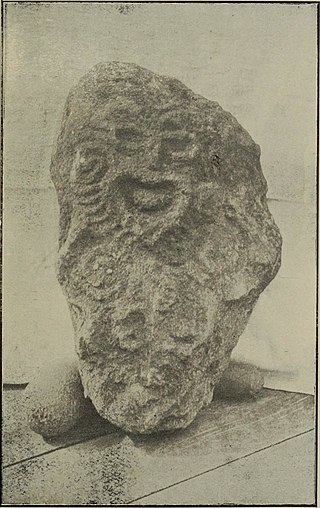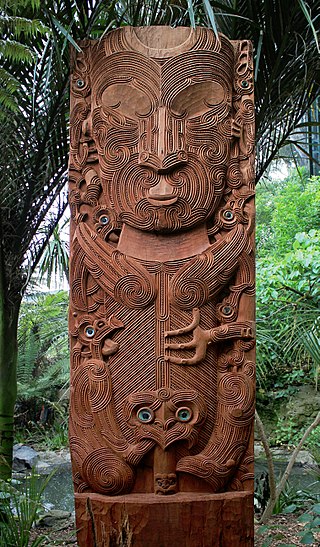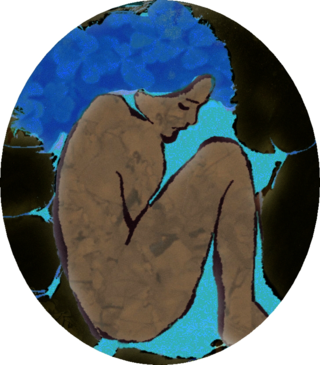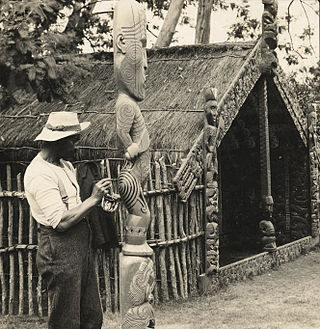Related Research Articles

In Māori mythology, Rongo or Rongo-mā-Tāne is a major god (atua) of cultivated plants, especially kumara, a vital crop. Other crops cultivated by Māori in traditional times included taro, yams (uwhi), cordyline (tī), and gourds (hue). Because of their tropical origin, most of these crops were difficult to grow except in the far north of the North Island, hence the importance of Rongo in New Zealand.

In Māori mythology the primal couple Rangi and Papa appear in a creation myth explaining the origin of the world and the Māori people. In some South Island dialects, Rangi is called Raki or Rakinui.

In Māori mythology, Tāne is the god of forests and of birds, and the son of Ranginui and Papatūānuku, the sky father and the earth mother, who used to lie in a tight embrace where their many children lived in the darkness between them.

In Māori mythology, Rehua is a very sacred personage, who lives in Te Putahi-nui-o-Rehua in Rangi-tuarea, the tenth and highest of the heavens in some versions of Māori lore. Rehua is identified with certain stars. To the Tūhoe people of the North Island he is Antares. Others say he is Betelgeuse, or Sirius. Because he lives in the highest of the skies, Rehua is untouched by death, and has the power to cure blindness, revive the dead, and heal any disease. He is a son of Rangi and Papa, and the father of Rūhi-te-rangi (mythology)|Kaitangata]], as well as the ancestor of Māui. A Ngāi Tahu legend from the South Island speaks of Rehua as the eldest son of Rangi and Papa, who first manifested as lightning, but assumed a human shape when he travelled into the skies. Later his brother Tāne went to pay him a visit, Rehua had birds in his hair, feeding on his lice. Rehua had his servants cook and prepare the birds as a meal for Tāne, who was shocked and declined to eat them because the birds had eaten the lice from Rehua's head, which was extremely tapu (sacred). However Rehua gave him birds to bring down to this world, and showed him how to snare them. Tāne also brought with him the fruit trees that the birds fed on, and so it is that there are forests and birds on the earth.
Tangaroa is the great atua of the sea, lakes, rivers, and creatures that live within them, especially fish, in Māori mythology. As Tangaroa-whakamau-tai he exercises control over the tides. He is sometimes depicted as a whale.

In Māori mythology, Tāwhirimātea is the god of weather, including thunder and lightning, wind, clouds and storms. He is a son of Papatūānuku and Ranginui. Tawhirimatea is the second oldest of 7 children, all of whom are boys. In his anger at his brothers for separating their parents, Tāwhirimātea destroyed the forests of Tāne, drove Tangaroa and his progeny into the sea, pursued Rongo and Haumia-tiketike till they had to take refuge in the bosom of their mother Papa, and only found in Tūmatauenga a worthy opponent and eternal enemy. To fight his brothers, Tāwhirimātea gathered an army of his children, winds and clouds of different kinds - including Apū-hau, Apū-matangi, Ao-nui, Ao-roa, Ao-pōuri, Ao-pōtango, Ao-whētuma, Ao-whekere, Ao-kāhiwahiwa, Ao-kānapanapa, Ao-pākinakina, Ao-pakarea, and Ao-tākawe. Grey translates these as 'fierce squalls, whirlwinds, dense clouds, massy clouds, dark clouds, gloomy thick clouds, fiery clouds, clouds which preceded hurricanes, clouds of fiery black, clouds reflecting glowing red light, clouds wildly drifting from all quarters and wildly bursting, clouds of thunder storms, and clouds hurriedly flying on'.
Tūmatauenga is the primary god of war and human activities such as hunting, food cultivation, fishing, and cooking in Māori mythology.
Ao (daylight) is one of the primal deities who are the unborn forces of nature in Māori mythology. Ao is the personification of light, clouds, and the ordinary world, as opposed to darkness and the underworld.
Atanua in Polynesian mythology is the goddess of the dawn and wife of Atea.
In Māori mythology, Atutahi is the name of Canopus,. Atutahi is the second brightest star in the night-time sky, second only to Sirius (Takurua). Aotahi, Autahi, and Atutahi, "First-light" or "Single-light", were equivalent names that also intimated the star's solitary or self-centered nature.

In Cook Islands mythology, Avatea was a lunar deity and the father of gods and men in Mangaian myth of origin. His eyes were thought to be the Sun and the Moon; he was also known as the god of light.
Haumia-tiketike is the god of all uncultivated vegetative food in Māori mythology. He is particularly associated with the starchy rhizome of the Pteridium esculentum, which became a major element of the Māori diet in former times. He contrasts with Rongo, the god of kūmara and all cultivated food plants.
Takatāpui is a Māori language term that is used in a similar way to LGBT. When speaking Māori, LGBT people of any culture are referred to as takatāpui. In English, a takatāpui person is a Māori individual who is gay, lesbian, bisexual, or transgender (LGBT).
Hemā is a figure in both Hawaiian and Maori mythology.

In Cook Islands mythology, Varima-te-takere also called Vari, was the primordial mother of the gods and mortals.

In Māori mythology, Punga is a supernatural being, the ancestor of sharks, lizards, rays, and all deformed, ugly things. All ugly and strange animals are Punga's children. Hence the saying Te aitanga a Punga used to describe an ugly person.
In Māori mythology, Rangahore is a wife of god Tāne. Tāne was looking for a wife, and asked his mother Papatūānuku to suggest suitable candidates. He took Rangahore to wife, but she gave birth to a stone, and Tane forsook her.
Io Matua Kore is often understood as the supreme being in Polynesian native religion, particularly of the Māori people.

In Māori mythology, Tiki is the first man created by either Tūmatauenga or Tāne. He found the first woman, Marikoriko, in a pond; she seduced him and he became the father of Hine-kau-ataata. By extension, a tiki is a large or small wooden, pounamu or other stone carving in humanoid form, notably worn on the neck as a hei-tiki, although this is a somewhat archaic usage in the Māori language. Hei-tiki are often considered taonga, especially if they are older and have been passed down throughout multiple generations. Carvings similar to ngā tiki and coming to represent deified ancestors are found in most Polynesian cultures. They often serve to mark the boundaries of sacred or significant sites. The word has cognates in other Polynesian languages, such as tiʻi in Tahitian and kiʻi in Hawaiian. In the Western world, Tiki culture, a movement inspired by various Pacific cultures, has become popular in the 20th and 21st centuries.

In Māori mythology, accounts vary somewhat as to the ancestry of Rātā. Usually he is a grandson of Tāwhaki and son of Wahieroa. Wahieroa is treacherously killed by Matuku-tangotango, an ogre. Rātā sets out to avenge the murder, travelling to the home of Matuku, where a servant of the ogre tells him that Matuku comes out to devour people each new moon, and that he can be killed at the pool where he washes his face and hair. Rātā waits till the ogre comes out and is leaning over with his head in the pool. He grabs him by the hair and kills him. Matuku's bones are used to make spears for hunting birds.
References
- ↑ Tregear, Edward. The Maori-Polynesian Comparative Dictionary. Lyon and Blair, 1891.
- ↑ Gunson, Niel. "Great families of Polynesia: Inter-island links and marriage patterns." The Journal of Pacific History 32.2 (1997): 139-179.
- ↑ BUCKOVÁ, Martina. "THE PHENOMENON OF THE CULTURE HERO IN POLYNESIAN MYTHOLOGICAL SYSTEMS." Asian & African Studies (13351257) 21.2 (2012).
- ↑ Johannes Andersen (13 December 2013). Myths & Legends of the Polynesians. Tuttle Publishing. pp. 345–. ISBN 978-1-4629-0778-6.
- 1 2 3 E. R. Tregear, Māori-Polynesian Comparative Dictionary (Lyon and Blair: Lambton Quay), 1891.
- ↑ E. M. Meletinsky, The Poetics of Myth (Routledge: London), 2000.
- ↑ David Eagleman (24 April 2009). Sum: Tales from the Afterlives. Canongate Books. pp. 97–. ISBN 978-1-84767-579-8.
- ↑ Ratzel, Friedrich. The History of Mankind Archived 2011-07-06 at the Wayback Machine . (London: MacMillan and Co., 1896, accessed 30 May 2010.